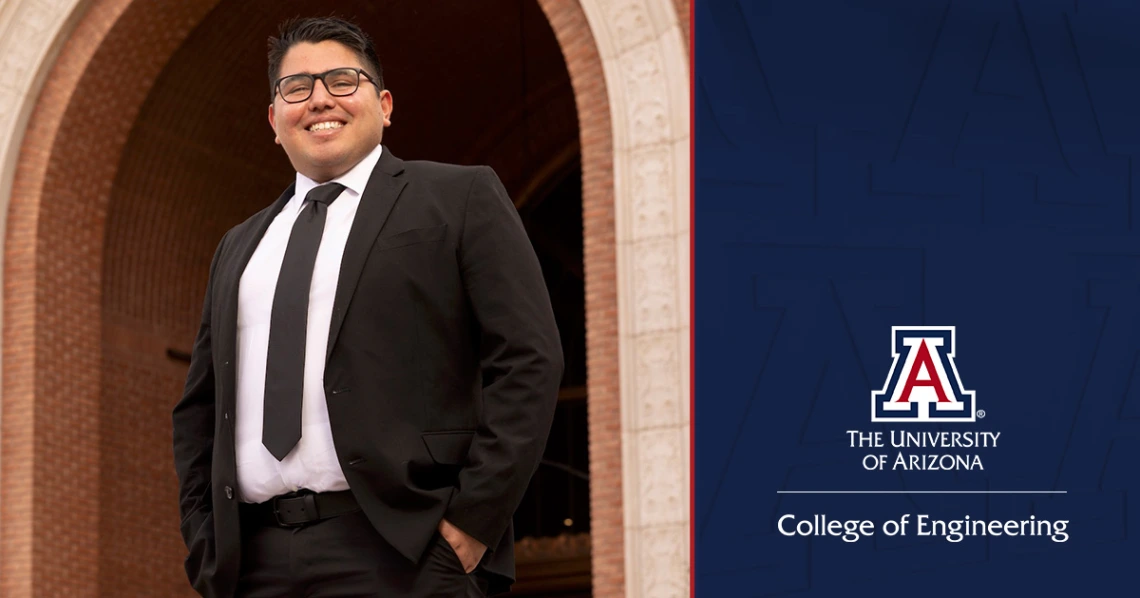Biomedical Engineering PhD Student Earns 2023 UA Centennial Award
Gerardo Figueroa is on a personal mission to show Hispanic youth the values of STEM education and guide the families of first-generation college students.

Biomedical engineering PhD student Gerardo Figueroa says the 2023 UA Centennial Achievement Award recognizes not just his accomplishments, but also it honors the diverse communities, organizations and causes he holds dear.
Gerardo Figueroa isn’t exactly a first-generation college student. His mother earned a degree in Mexico. But the Centennial Achievement Award winner feels as though many of his experiences mirror those of first-generation students, spurring him to serve as a strong proponent for STEM education among Hispanics. He did not plan to earn a graduate degree when he started as an undergraduate at the University of Arizona either, but he saw a need for role models, and he is excited to help fill the gap.
Figueroa was among nine students – two undergraduates and seven graduates – to receive University of Arizona Centennial Achievement Awards in 2023. Established in 1984, the annual awards value diverse experiences and support students who have demonstrated integrity, persistence and a commitment to their communities and families.
“It’s a huge honor. Only a few of us are recognized every year, so it means a lot,” said Figueroa, a third-year biomedical engineering doctoral student. “It’s recognition both for me and for the organizations that I’ve been part of.”
Passionate about STEM outreach, Figueroa was involved with the university’s Society of Hispanic Professional Engineers chapter while earning a bachelor’s in biomedical engineering. He remains active in SHPE’s national group, helping parents of first-generation engineering students understand the culture and life changes around their children going to college. He also takes part in outreach through the Orthopaedic Research Society, an international organization that accelerates musculoskeletal discovery to improve health.
After graduating in 2021, Figueroa returned to his hometown of San Luis, Arizona, in Yuma County near the Mexican border, to teach engineering at a summer camp run by the local school district.
“It was really rewarding, not only talking to the students, but also the teachers, about how much difference it could make for someone from the town to come back to teach – someone who graduated from engineering and is continuing their education,” he said, adding, “The kids really look up to that.”
Journey to a Fulfilling Career
Figueroa was born in Mexico and was 8 years old when he moved to the U.S. He identifies as a first-generation student because of his immigrant experiences. He had no plans to earn a graduate degree when he first began studying at the UA. He knew of few Hispanic students pursuing research-intensive degrees, and Figueroa was not aware of the career opportunities a graduate degree would hold. But with the help of mentors and clubs, he found a home in the college and an academic career path in engineering.
The experience has been bittersweet, said Figueroa. On one hand, it is hard to explain the research he does to his family. On the other hand, even if they do not completely understand what is involved in his work, they are unquestionably proud of Figueroa’s accomplishments.
Figueroa is part of the Orthopedics Biomaterials Laboratory, led by Dr. David Margolis from the Orthopedic Surgery Department in the College of Medicine. Margolis nominated Figueroa for the Centennial Achievement Award.
Figueroa’s research focuses on developing bone tissue engineering technologies and monitoring long-term bone health using osseosurface electronics, which are paper-thin devices that attach directly to bones. As an undergraduate, he participated in several nationally recognized programs, including the Ronald E. McNair Achievement and Arizona/NASA Space Grant. His work has been presented in professional organizations such as the Society for Biomaterials and the Orthopaedic Research Society.
Now 25, the STEM activist plans to become a tenure-track professor at a research-intensive university. He hopes to build a strong, collaborative biomedical research team dedicated to meaningful mentorship and outreach.

